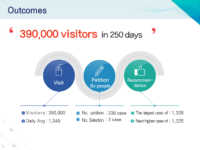In order to continuously improve public policies and correct any deployment difficulties, the French Government has set up a data-driven steering system that allows it to monitor the results of more than 60 priority policies across all departments in its territory. This system is embodied by an internal steering and monitoring tool (PILOTE) and a citizen information site presenting the results in open data.
Innovation Tag Opengov: monitoring
Bağcılar Municipality has implemented an Algorithmic Decision Systems model for evaluating public services to maximizing the value proposition and satisfaction level at the minimum cost. This model enables the municipality to make decisions regarding the investment worthiness of its current and planned services and activities, as well as the direction of improvements needed in existing products and services, both in the eyes of stakeholders and the organization.
Case Study
Monitoring and participatory evaluation of the National Strategy to Combat Poverty 2021-2030 (ENCP)

As part of the National Strategy to Combat Poverty (ENCP), PlanAPP is piloting a participatory monitoring and evaluation (M&E) model. This model involves designing mechanisms for participation in collaboration with social sector organisations. Following this, individuals living in poverty will participate in the M&E process of the ENCP from its inception. The goal is to enhance the development of well-informed and contextually relevant public policies, foster a culture of participation, and…
Case Study
Libellula – a civic monitoring lab and a format to build and sustain a local civic monitoring…
Libellula is a laboratory for civic monitoring of local public spending and a format to build and sustain a local civic monitoring coalition. The first lab is based in Messina, Sicily. Moving from monitoring a specific case, Libellula aims at building a civic multi-stakeholder coalition which, while monitoring, simultaneously cultivates skills and capabilities of those involved to advocate for transparent and collaborative public spending in order to address the misuse of public money.
GovTech Poland has developed world's first challenge based procurement model where the authors of the best idea receive a full implementation contract without the need for an additional cumbersome tender. With the goal of opening procurement to all creative individuals, the model covers the process from identification to implementation. A pilot run, tested in both central and local institutions has increased SME participation in procurement processes by an average of 1600% (in a sample of 250)…
Case Study
Monitoring of the Implementation of the Access to Information Act in the Federal Executive Branch
With the maturing of the Transparency Policy in the Brazilian Federal Executive Branch, there was a need to broaden the assessment of the implementation of the Access to Information Act. The innovation here lies in the methodology adopted, which was previously quantitative and is now also qualitative, allowing an improvement in the answers provided to citizens and the extension of the transparency culture, favoring all stakeholders: public bodies under assessment, citizens and the Government.
Previous government-led safety inspection systems were not reflective of social needs and public interest in the foods and drugs that should be on the market.
The new system allows people not only to make policy proposals but to actively participate in food and drug inspections as well.
People are empowered to request inspection or examination of products when there is a growing public concern over the safety of the food or drug in question. The government will respond with an inspection or…
Citizen-centric Municipal Governance Scorecard is an innovation for improving local good governance. The main objective is furthering local good governance through transforming good governance principles into practical, measurable processes and actions. The model consisted of 227 indicators for the seven principles along decision-making, resource allocation, service delivery and institutional capacity stages. The data collection is geared for citizen use, based on digitally available…
Innovation helps citizens extract value from open data on the use of public funds and fosters accountability of public authorities for goods, services and works purchased. With the help of the electronic platform, the citizens and business can complain about non-competitive behaviour, poor quality or check the efficiency of procurement by their city council, school, hospital. Introduction of AI-powered risk monitoring allowed anyone to find and act upon violations in a fast and simple manner.
MTender is a revolutionary tool which will transform the way public funds are spent in Moldova, a country with a long history of corruption.
The world’s first fully digital public procurement system, MTender uses open data to manage every element of the public contracting system. This enables officials to do their jobs better, citizens to hold the government to account, taxpayers to get a better deal, and businesses to compete on a level playing field.



